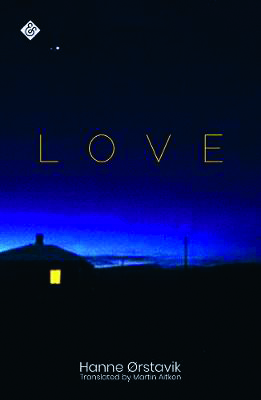Hanne Ørstavik is no household name in the UK but in her native Norway she has been recognised as an important, provocative writer since the publication of her breakthrough novel Love in 1997. This award-winning novel about the unnerving mental and physical relationship between a single mother and her young son launched Østravik’s subsequent sterling literary career and became an established part of Norway’s literary canon, counting the country’s poster boy novelist Karl Ove Knausgård as one of its enthusiastic fans. Finally, it’s being published in the UK, so that we might see for ourselves what all the fuss was about.

And Love does not disappoint. In fact, I was immediately lost to it, hooked within two pages, and already anxious about what was in store for the two convincingly drawn leads. We are introduced to mother and son almost simultaneously, switching from one stream of consciousness to the other paragraph by paragraph. Jon is eight years old and vulnerable, waiting alone at home for the sound of his mother’s car, which his ‘tummy’ recognises before his brain. He anticipates every move Vibeke will make after she walks through the door; she will hang her coat on a peg, look at herself in the mirror, change into soft sandals. She will be tired – perhaps he can give her a neck massage, or brush her hair.
This is a deceptively simple novel which avoids hyperbolic adjectives and sentimental summaries
Vibeke’s mind is on other matters; a minor success at work, the books she has brought home from the library, the daring plum lipstick she is waiting for a chance to debut. She makes Jon’s dinner and they share their meal as usual. But while her gestures and words are affectionate, her thoughts are of the life she enjoys when he’s not there, the romantic daydream she nurtures of the dark, brown-eyed man who will notice her new lipstick at the glitzy party she will soon throw. She doesn’t hear Jon go out.
Written in a sparse, economical manner, this is a deceptively simple novel which avoids hyperbolic adjectives and sentimental summaries. But it is also a highly sophisticated piece, becoming emotionally profound as the increasingly interlacing viewpoints highlight the growing space between Jon and Vibeke; his innocence and faith in her big plans for his birthday the next day, her constant focus on a different kind of love (she has forgotten Jon’s birthday).
It is not a salutary moral tale, Ørstavik is too knowing and deep-thinking for that. There is sympathy for both protagonists; the little boy desperate for security, protection, and affection, the single mother lonely and hoping for romance, passion, and care. As we follow their separate odysseys out into the unforgiving coldness of the Norwegian night, our hearts begin to thud with the creeping fear of something going very wrong. If you can pull yourself away from this evocative, affecting and expertly woven tale before you find out what happens, you’re made of tougher stuff than me.

Slovak writer Balla’s Big Love is another heralded novel new to English translation, this from 2015. And it too crackles from the first page. From a scholarly point of view it’s an astute commentary on the contradictions and disappointments of post-Communist Central Europe. But it’s also an extremely funny absurdist portrait of an anxious, paranoid civil servant who sees enemies and traps everywhere he looks. The dialogue is quite brilliant, spontaneous and half crazy. It’s outrageously fun and pleasurable to read, bearing in mind its underlying seriousness. Treat yourself.









